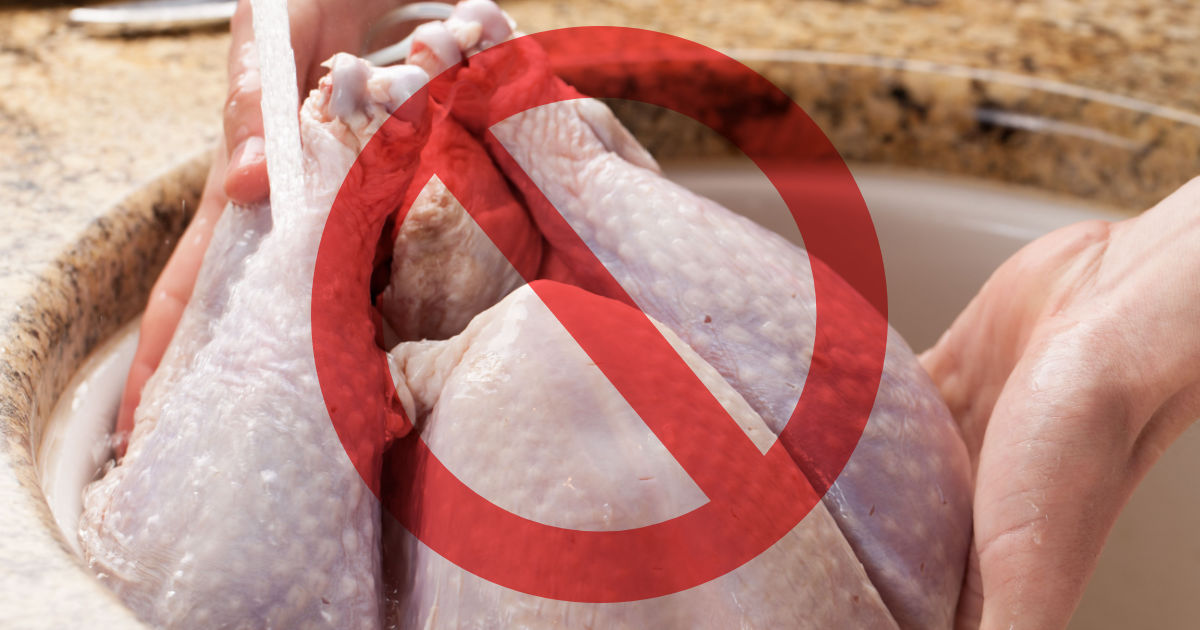Many people are in the habit of washing poultry before cooking it. After all, rinsing chicken and turkey helps remove bacteria, just like with produce, right? However, this is far from the truth. Raw turkey and chicken can be contaminated with bacteria like campylobacter and salmonella, which can cause foodborne illnesses. But rinsing poultry doesn’t remove bacteria; it spreads them around the kitchen and makes them more likely to infect people.
Stop rinsing your raw turkey and chicken
The U.S. Department of Agriculture has strongly encouraged people to avoid the unsafe rinsing step. “…It’s virtually impossible to wash bacteria off the bird,” they posted in a 2017 Thanksgiving notice. “Instead, juices that splash during washing can transfer bacteria onto the surfaces of your kitchen, other foods and utensils.” [1]
Similarly, the U.S. Centers for Disease Control and Prevention has also lobbied against the practice. “Federal food safety advice has recommended against washing turkey or chicken since 2005, but some habits are hard to break,” the CDC says. “But a 2020 survey found that 78% of participants reported washing or rinsing turkey before cooking. Old recipes and family cooking traditions may tempt you to keep this practice going, but it can make you and your family sick.” The mentioned survey involved 3,625 adults in the U.S.
The juice from rinsing poultry can spread farther than you think. Droplets can fly across the sink and reach countertops, utensils, and food. If you still decide to rinse raw chicken or turkey, immediately sanitize the sink and everything in the area. However, keep in mind that a study from the USDA found that 1 in 7 people who washed their sink after rinsing chicken still had bacteria left in their sink. [2]
Read: How to Plan an All-Natural and Vegan Thanksgiving Party
How to prepare poultry safely
Always be wary when handling raw poultry, from when you buy it until you cook it. After purchasing, place the chicken or turkey in a disposable bag to prevent the juices from touching other foods, especially those eaten raw, like produce. Then, store the bagged poultry at the bottom of the fridge to avoid dripping onto other foods. Frozen poultry should be kept in the freezer until it’s time to thaw it. Ensure the temperature is at 0 degrees Fahrenheit or lower, and don’t store it in areas where you can’t control the temperature, like in snow or a basement.
Thawing tips: Keep the frozen poultry in its original container and place it into the refrigerator. For a big, Thanksgiving-sized turkey, allow 24 hours of thawing for every 4 or 5 pounds of bird. Plus, thawed poultry can stay in the fridge for one or two days before cooking. Alternatively, you can thaw poultry in the microwave following the manufacturer’s instructions and then cook it immediately.
Or, you can thaw in cold water by placing the poultry in a sealed plastic bag and submerging it in cold tap water, changing the water every half an hour. Never thaw poultry on the counter. Even if the center stays frozen, the edges can become warm enough to grow bacteria if left out for more than two hours. When it’s time to cook, wash your hands with soapy water for at least 20 seconds before and after handling the poultry.
And remember, no rinsing the turkey or chicken. Instead, place the bird directly into the pan or pot. If there’s prep work required, use a separate knife and cutting board, and keep fresh produce or cooked food away from the raw poultry during this process. Wash all utensils, dishes, and countertops that come into contact with the raw poultry.
The best way to remove bacteria from poultry
Rinsing turkey and chicken is not necessary because the heat from cooking will kill all germs, provided the inside gets cooked properly. The poultry should reach an internal cooking temperature of 165 degrees Fahrenheit to ensure this. [3] Similarly, if you cook stuffing inside a turkey, use a food thermometer to ensure the center of the stuffing also reaches 165 degrees. Then, after removing it from the oven, allow the turkey to stand for 20 minutes before removing the stuffing. This will cook the stuffing a little more and make the bird easier to carve. [4]
Finally, here are the tips for leftovers. Store leftovers in the fridge at 40 degrees Fahrenheit or colder. Don’t allow the food to sit out for longer than two hours. Cooked foods sitting at room temperature can grow bacteria, and this scenario is the second most common cause of food poisoning. If the food is exposed to higher temperatures, like in a hot car, refrigerate it within one hour. Remember, you do not need to wait for a food to cool off before freezing or refrigerating it. And be sure to reheat leftovers to at least 165 degrees before eating.
Keep Reading: Why You Should Consider Eating Raw Garlic Daily
Sources
- “To Wash or Not to Wash… Your Turkey?” USDA. Donna Karlsons. February 21, 2017
- “Preparing Your Holiday Turkey Safely.” CDC.
- “Please! For the Love of Food Safety, Stop Washing Your Chicken.” Food Network. Toby Amidor, M.S., R.D., C.D.N. September 27, 2019.
- “Don’t Wash Your Thanksgiving Turkey, CDC Warns.” WebMD. Ralph Ellis. November 22, 2021

